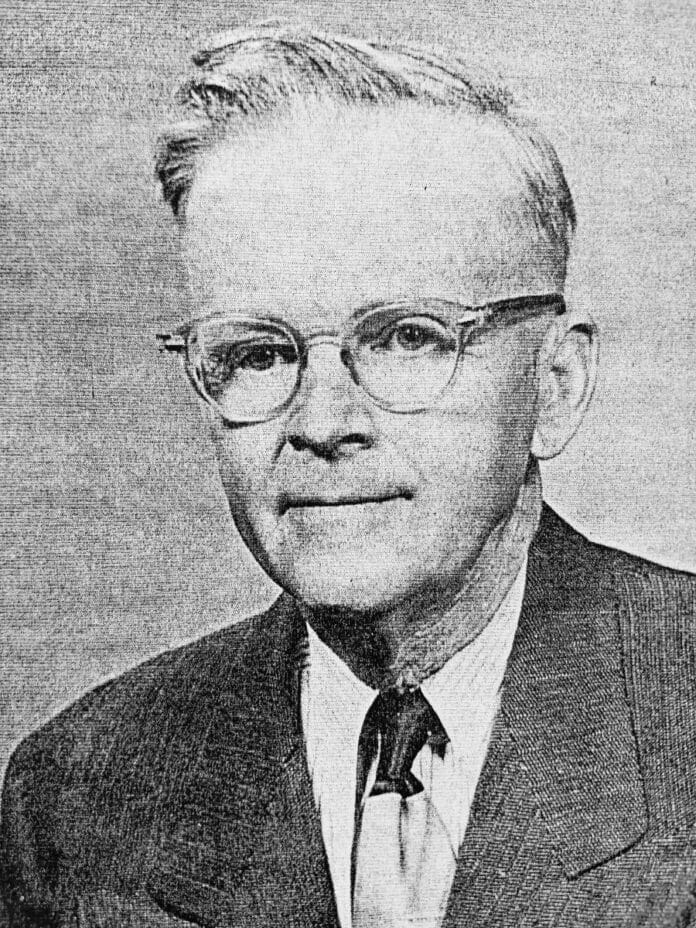Have you ever heard the phrase “normal school”? Did you ever wonder, “What is a ‘normal school’?” Today, the article we share with you is written by Mr. Grover G. Brown, Feb. 7, 1963. Mr. Brown is about to tell us all about the “normal school.”
Around the turn of the century, from 1892 until 1906, a series of schools were held in Brown County. These were called county normal schools. This was strictly a private affair and had no legal connection with either the county or state school system. There was no law that controlled it in any way.
The purpose of their school was to help applicants pass a teacher’s examination for license. Many of the students enrolled were young people who were seeking their first license. Others who may have taught before also enrolled. Some of these were ambitious teachers wanting to do a better job. Some enrolled because they had difficulty making a license.
At that time, there were only two requirements to begin teaching. One was the applicant must be 16 years old. The other was that he must make a six-month license on a written examination. It was not necessary to be even an eighth-grade graduate.
A teacher could teach one term on a six-month license. After that he must make a 12-month license. He could teach a lifetime if he could make a 12-month license each year. If he made 24-month license, he could teach two terms, and 36 months meant three years. A three-year license qualified one to run for county superintendent of schools. All applicants wrote on the same test.
For the most part, these schools reviewed the eighth-grade work. They were taught by outstanding Brown County teachers. The instruction offered was practical. It was given by men who knew the everyday problems of the schoolroom. The school was conducted in one-room buildings at Nashville, Becks Grove and Pikes Peak The length of the term was either five weeks, six weeks or 10 weeks. The standard price of the tuition was about $1 per week.
In 1900, a similar school was held at Becks Grove. The instructors were James “Bun” Taylor, William G. Moore and David Beck. Beck was county superintendent of Brown County Schools from 1877 to 1881. The term was six weeks and the tuition was $6.
In 1901, another school was held at Becks Grove with the same instructors, same length of term and same tuition. In 1902, Grant Moore and Bun Taylor taught another school at Becks Grove. There were about 25 students here.
For the above information I am indebted to Mr. and Mrs. Sylvester Barnes, Vernon Deckard and George W. Anthony.
The earliest of these schools that I personally know about was at Nashville in 1892. It is most likely that others were held earlier. George Anthony attended this one.
Sylvester Barns reports that he attended such a school in Nashville in 1897. It was taught by William L. Coffee and Charles W. Snyder. The term was six weeks and the tuition was $5. In 1898, Sylvester Barnes attended another. He estimates there were between 30 and 40 enrolled. The term again was six weeks and the tuition was $5.
In 1899, Barnes was back for the third time. The instructors were E.G. Walker and Coffee. This time, Barnes was able to make his first license. He says this was one of the red-letter days of his life. It was the fulfillment of his ambition. This was the humble beginning of the teaching career of one of the greatest teachers who ever taught in Brown County.
In 1908, Melvin Hurley and Lemuel J. Moore held a county normal at Pikes Peak. It lasted 10 weeks and the tuition was $10. John Eddy, Joe Robertson, Nelle Clark, Grace Campbell and I have come up with the following list of applicants in this school. There is no official list available: Add Allen, Elma Allen, Thomas Ayers, May Bright, Grover G. Brown, Emmons Clark, Myrtle Clark, Harry Kelley, Thurman Clark, John Downey, John Eddy, Charles Hines, Nellie Hendricks, Olive Kelp, Nellie Lucas, Vernon Lutes, Mont Percifield, Joe Robertson, Joe Seal, John Sherrill, Mamie Talkington and Lew Hurley. Harley Carmichael may have been enrolled.
No one in the group had an automobile. They were not available to any one at that time. Vernon Deckard was the only young man who had a horse and buggy. John Sherrill had a bicycle. The rest of us were strictly on foot.
These normal schools took the place of our present-day high schools and teacher colleges. They served a district purpose in their day.
When William L. Coffee became county superintendent in 1903, he began to urge teachers to go away to college and really prepare to teach. At first, it was just a 10-week spring term in Central Normal, at Danville or Indiana State Teachers College at Terre Haute. At that time, Indiana University was doing practically nothing in training elementary teachers.
NOTE: If anyone knows of any other normal schools held in Brown County at any time, we would like to have the information. It should become a part of history written about Brown County. We are sure there were others. We think the last one was held in Nashville and conducted by Otis Calvin about 1903.
Submitted by Pauline Hoover, Brown County Historical Society





